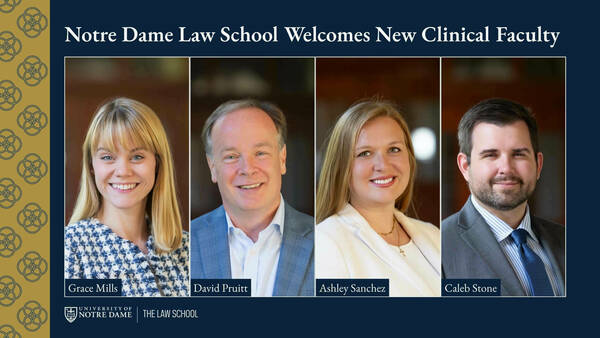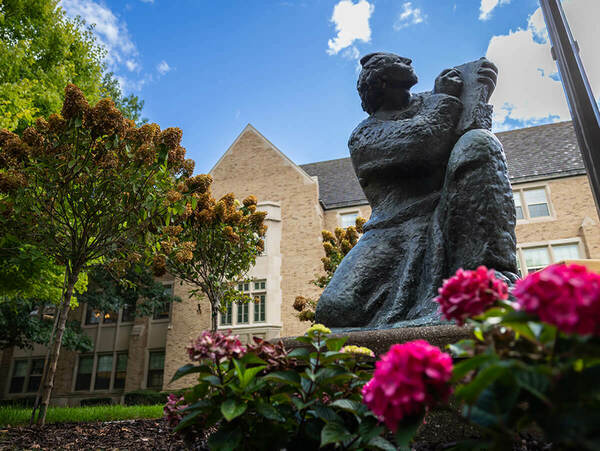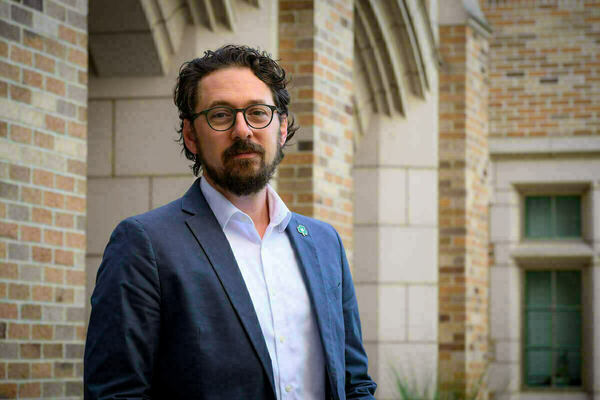Notre Dame selected as ACS Bridge Department, expanding opportunities for students in chemistry and biochemistry
The University of Notre Dame’s Department of Chemistry and Biochemistry has been named an American Chemical Society (ACS) Bridge Department, an honor recognizing the University's dedication to providing targeted support to students from historically marginalized groups who are pursuing graduate degrees in chemistry and biochemistry.
The designation is part of the ACS Bridge Program, which provides resources to both students and participating institutions. The resources include mentoring, academic support, and opportunities for hands-on research. The program is designed to bridge the gap between undergraduate and graduate studies, ensuring participants are well-prepared to excel in doctoral programs.
“We have structures in place so that if any of the ACS Bridge students decide to pursue their graduate studies at Notre Dame, they’ll be well-supported and will come into an ecosystem that’s going to allow them to thrive,” said Steven Corcelli, chair of the Department of Chemistry and Biochemistry.
Corcelli credits Brittany Morgan, the John V. O’Connor Assistant Professor in Cancer Drug Discovery, as well as students in the department’s Chemistry Graduate Student Organization (CGSO) association, with being instrumental in obtaining the ACS program’s designation.
“Our chemistry department has a strong commitment to supporting underrepresented students, and we believe that this program will provide unique opportunities for them,” said Avraz Anwar, president of the CGSO and a doctoral student in the laboratory of Juan Del Valle, the W.K. Warren Family Professor for the Warren Family Research Center for Drug Discovery and Development. “The current strengths from having a strong group of underrepresented students in the graduate program include strong mentorship connections, supportive work environments, and diverse perspectives that enable problem-solving.”
The ACS Bridge Program is part of the Inclusive Graduate Education Network (IGEN), a national effort to broaden access to graduate studies in the physical sciences. The program serves as a centralized clearinghouse, allowing underrepresented students to apply to multiple Bridge Departments through a single application. Some of the other 40 public and private schools in the program include Brown University, Yale University, Purdue University, University of California Berkeley, and others.
“Students can submit an application to the ACS Bridge Program, and by doing so, they are effectively applying to 50 departments all in one swoop … and that's going to help with expanding the diversity of our program even further,” Corcelli said.
Corcelli had made inclusion in the ACS Bridge Program a goal when he became department chair, in part because it highlights the hard work the department has already done to assure that chemistry graduate students come from a wide range of backgrounds and experiences.
“This endorsement from the ACS is tremendous validation for our sustained efforts to holistically support our graduate students and cultivate a diverse and inclusive program,” he said.
Originally published by at science.nd.edu on January 10, 2025.
Latest Research
- ND research teams awarded funding to address sustainability challenges around the worldNotre Dame's Just Transformations to Sustainability Initiative has awarded funding to three cross-disciplinary faculty teams leading research on pressing sustainability issues—including forest conservation in the Amazon, watershed…
- Fighting to improve hurricane forecastsResearchers at Notre Dame are improving hurricane forecast accuracy, giving officials time to evacuate and protect residents. Read the article
- 2025 Naughton Fellowships awarded to four joint faculty projectsThe University of Notre Dame’s Naughton Fellowship program has announced its faculty awardees for the 2025-2026 cohort. Faculty from leading Irish universities and Notre Dame have come together to work on four research projects as a part of the Naughton Faculty…
- Notre Dame Law School Welcomes Four New Clinical Faculty Members for 2025–26Notre Dame Law School is pleased to welcome four new clinical faculty members for the 2025–26 academic year. “It is an honor to welcome such a distinguished group of clinical professors to Notre Dame Law School. Their impressive achievements and deep sense of vocation will enrich our academic…
- Six early-career scholars join the inaugural Provost’s Postdoctoral Fellowship Program.Six interdisciplinary scholars have joined the College of Arts & Letters at the University of Notre Dame to continue their research, obtain invaluable support, and engage in professional development as part of the inaugural Provost’s…
- Politics inspired Democracy Initiative managing director from early ageThis is the first in a series of features highlighting the managing directors of the University's strategic initiatives. The managing directors are key (senior) staff members who work directly with the faculty directors to help implement and operationalize the vision for the initiatives, oversee initiative staff, and serve as thought partners for the faculty directors.











